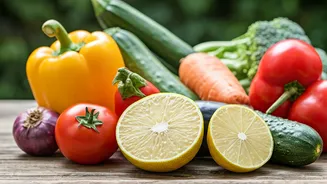Introduction: Bloating Basics
Bloating, that uncomfortable feeling of fullness and abdominal distension, often stems from trapped gas, slow digestion, or an imbalance in gut bacteria.
It can be triggered by various factors, including certain foods, eating habits, and underlying medical conditions. While occasional bloating is common, persistent discomfort can significantly impact your quality of life. Fortunately, dietary adjustments can provide significant relief. This guide explores ten specific foods known for their ability to combat bloating, providing practical advice on how to incorporate them into your routine for a healthier, more comfortable digestive system. These foods are easily accessible and generally beneficial for overall gut health.
Ginger: Digestive Dynamo
Ginger has long been celebrated for its medicinal properties, particularly its ability to ease digestive issues. It contains gingerol, a compound known to accelerate gastric emptying, thereby reducing the chance of gas buildup and bloating. Ginger also acts as an anti-inflammatory agent, which can further soothe the digestive tract. You can consume ginger in various forms, including fresh, dried, or as a tea. Adding a slice of fresh ginger to your meals, sipping ginger tea after a meal, or even taking a ginger supplement can provide significant relief. Its versatility makes it easy to integrate into your daily diet, promoting healthier digestion and easing bloating naturally. Regular consumption of ginger can contribute to a reduction in gas and discomfort.
Peppermint: Smooth Muscle Soother
Peppermint is renowned for its calming effects on the digestive system, mainly because of its primary active ingredient, menthol. Menthol helps relax the smooth muscles of the digestive tract, thus alleviating spasms and facilitating the passage of gas. Studies have indicated that peppermint oil capsules can be highly effective in reducing symptoms of irritable bowel syndrome (IBS), including bloating. Peppermint tea is a delightful and accessible way to experience these benefits. You can also find peppermint in candies or essential oils, though it's crucial to consume them in moderation. Regular intake can provide considerable relief from bloating and other digestive symptoms by promoting smooth muscle function in your gut. It offers a natural approach to achieving digestive comfort.
Fennel: Carminative Powerhouse
Fennel is a natural carminative, meaning it helps to expel gas from the digestive system. Fennel seeds contain compounds that relax the intestinal muscles, facilitating the release of trapped gas and reducing bloating. You can chew fennel seeds after meals, brew them into a tea, or use them as a culinary herb. Fennel also stimulates bile production, which helps digest fats and prevent gas formation. Its pleasant anise-like flavor makes it an easy addition to your diet. Incorporating fennel seeds or tea into your routine can lead to reduced bloating and improved digestion. This versatile herb offers a natural and effective solution to alleviate discomfort.
Papaya: Enzyme Enriched
Papaya is rich in papain, an enzyme that aids in breaking down proteins, making digestion smoother and more efficient. By assisting in the breakdown of food, papain reduces the likelihood of undigested food fermenting in the gut, which is a common cause of gas and bloating. Eating papaya can help prevent or alleviate bloating, especially after consuming a heavy meal. Ripe papayas have a sweet, tropical taste and can be eaten fresh as a snack or included in smoothies or salads. Its ease of consumption and beneficial enzymes make papaya a tasty and effective way to support healthy digestion. Papain's action helps reduce discomfort and promote better gut health naturally.
Pineapple: Bromelain Boost
Similar to papaya, pineapple contains enzymes that aid digestion, specifically bromelain. Bromelain helps break down proteins and has anti-inflammatory properties, making it beneficial for reducing bloating and inflammation in the gut. Consuming pineapple, especially after meals containing protein, can prevent bloating by speeding up the digestive process. Fresh pineapple is the best way to gain its digestive benefits. It is also an incredibly flavorful fruit. Adding pineapple to your diet provides an enjoyable way to reduce bloating and support digestive health. The enzymes found in pineapple actively work to soothe your gut.
Bananas: Potassium Champion
Bananas are rich in potassium, an electrolyte that helps regulate fluid balance and can prevent water retention, a factor contributing to bloating. They also contain fiber, which promotes regular bowel movements, preventing constipation and reducing gas buildup. Consuming bananas regularly supports a healthy digestive system, particularly when dealing with water retention caused by high sodium diets. Bananas are a convenient and easily portable snack. They can be enjoyed as is, added to smoothies, or sliced and added to breakfast cereals. Their high potassium content aids in regulating fluids. Consequently, bananas offer a practical and effective way to minimize bloating and enhance digestive comfort.
Yogurt: Probiotic Power
Yogurt containing live and active cultures, or probiotics, supports a healthy gut microbiome by introducing beneficial bacteria. A balanced gut flora is essential for proper digestion and can help reduce bloating by improving the breakdown of food and reducing gas production. Probiotics can alleviate bloating and other digestive discomforts. Select yogurts with labels that state 'live and active cultures.' You can add yogurt to your breakfast, use it in smoothies, or consume it as a snack. Consistent consumption of probiotic-rich yogurt can lead to improved gut health and a noticeable reduction in bloating. It offers a flavorful way to maintain a healthy digestive system.
Asparagus: Natural Diuretic
Asparagus is a natural diuretic, which helps flush out excess water from the body. This is particularly helpful if you're experiencing bloating due to water retention. Asparagus also contains inulin, a type of fiber that acts as a prebiotic, feeding the beneficial bacteria in your gut. By promoting healthy gut bacteria and reducing water retention, asparagus helps to combat bloating and promote digestive health. Asparagus can be steamed, roasted, grilled, or eaten in salads. Incorporating asparagus into your diet can help reduce bloating and contribute to a healthier digestive system through its diuretic and prebiotic properties. It offers a nutritious approach to managing bloating.
Oats: Fiber Friend
Oats are a great source of soluble fiber, which helps regulate bowel movements and can reduce gas and bloating. Soluble fiber absorbs water in the digestive tract, aiding in the smooth passage of waste and preventing constipation, a common cause of bloating. Oats are a versatile food that can be enjoyed as oatmeal, added to smoothies, or incorporated into baked goods. The fiber content in oats supports a healthy digestive system. Consuming oats regularly can help relieve bloating and promote regular bowel function, thus contributing to overall digestive wellness. Oats are a simple, easily accessible dietary addition with significant benefits.
Water: Hydration Hero
While not a food, water plays a crucial role in digestive health and can directly affect bloating. Staying well-hydrated helps your body flush out excess sodium, which can contribute to water retention and bloating. Drinking plenty of water also helps move food through the digestive tract, preventing constipation and gas buildup. Aim for at least eight glasses of water per day. This can include plain water, herbal teas, or water-rich fruits and vegetables. Adequate hydration is critical for optimal digestive function. It's a simple yet highly effective way to reduce bloating and support overall well-being. Proper hydration works with the other dietary changes for better digestion.














